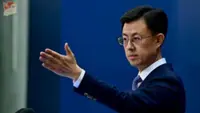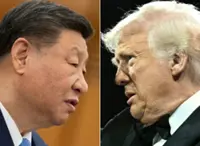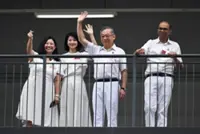
The Straits Times Index surged 8.2 per cent when trading opened. The STI has dropped 14.2 per cent since Trump announced the sweeping tariffs on April 2. - ST
TOKYO: Asian share markets rebounded strongly in early trading on Thursday (April 10) as investors picked up battered stocks after US President Donald Trump announced a 90-day pause on global tariffs announced last week for every country except China.
Singapore’s Straits Times Index surged 8.2 per cent as soon as trading opened. The STI has dropped 14.2 per cent since Trump announced the sweeping tariffs on April 2.
Japan’s Nikkei index soared 8.6 per cent, South Korea’s Kospi index was up 5 per cent, while Australia’s ASX 200 jumped 6 per cent.
Overnight, the Trump pause sent US stocks soaring, with the S&P 500 closing up 9.5 per cent. The Dow index ended 7.9 per cent higher, while the Nasdaq rose 12.2 per cent to notch its best day in 24 years.
In an afternoon announcement on April 9, Trump said he would temporarily lower many new tariffs, but raised the levy on imports from China to 125 per cent. The pause on tariffs from dozens of trading partners came less than 24 hours after they kicked in.
The increase in China tariffs was in retaliation to China’s announcement of a levy of 84 per cent on US goods starting April 10.
While Trump’s announcement still left investors with uncertainty about his ultimate tariff policy, traders took the opportunity to shop for beaten-down stocks. Since Trump announced broad tariffs late on April 2, US stocks had fallen more than 12 per cent, for their biggest four-day sell-off in five years.
“Markets had been looking for a reason to rally for a few days. Markets can only sustain extreme conditions for so long before exhaustion sets in, rather like a toddler and a tantrum,” said BMO Private Wealth chief market strategist Carol Schleif.
“The 90-day suspension does allow nice breathing room to allow negotiation to settle in and market valuations have clearly been reset. Yet the uncertainty for companies remains.”
After Trump’s reversal, Goldman Sachs said it was rescinding its recession forecast and reverting to its previous baseline estimate for the economy to grow in 2025.
Charles Schwab senior investment strategist Kevin Gordon said the market rally from oversold levels made sense. But he cautioned that “to have a high conviction call on anything right now is a fool’s errand”.
“We just have to wait and see what the ultimate policy is, but unfortunately the policy changes almost on a daily basis,” said Gordon.
“You have to put yourself in the shoes of a business that’s trying to make capital spending or hiring plans in this environment. If the rules of the game are constantly changing on a day-to-day basis, I don’t see how that’s a healthy environment for businesses.”-- Bloomberg











































